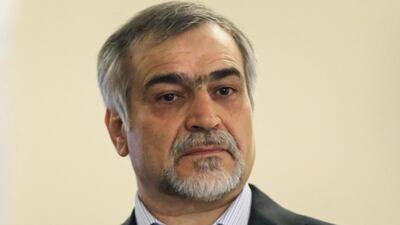Hossein Fereydoun, the brother of Iranian president Hassan Rouhani, has been released on bail following his arrest on charges of financial crime, media reported.
The court "accepted the bail" and Mr Fereydoun — who helped Mr Rouhani during nuclear talks that led to Iran's 2015 agreement with world powers — was freed on Monday night, the ISNA news agency said.
Judiciary spokesman Gholamhossein Mohseni-Ejeie announced Mr Fereydoun's arrest on Sunday, saying he was the subject of "multiple investigations".
Mr Fereydoun appeared on Monday at the prosecutor’s office but left shortly after in an ambulance after feeling ill, according to state-run Tasnim news agency. It later said he had been freed with bail set at 500 billion rials (Dh56.35 million). There was no immediate confirmation from officials but local media reported that the court eventually reduced the bail to 350bn rials.
The brothers do not share the same name because Mr Rouhani changed his when he was younger to a word meaning "cleric".
The arrest is seen as part of a long-running feud between the presidency and the judiciary that has taken new turns in recent months, particularly before and after Mr Rouhani's re-election in May.
The conservative-dominated judiciary has clashed with Mr Rouhani, who has sought to ease social restrictions and release political prisoners.
Some of Mr Rouhani's political opponents have condemned the 2015 nuclear deal, which traded sanctions relief for the curbing of Iran’s nuclear programme. They say the president and his team were too lenient and that the agreement has failed to reap promised economic benefits. The judiciary, which operates independently from Mr Rouhani’s government, is run by more hardline politicians.
Mr Fereydoun, sometimes referred to in Iran as Mr Rouhani’s “eyes and ears”, had already been the target of attacks by some conservatives. They alleged he played a role in a scandal that emerged a year ago over high executive wages by appointing one of the paid directors.
The head of the General Inspection Organisation, Naser Seraj, first accused Mr Fereydoun of financial violations, saying he had influenced the appointment of two bank directors — one of whom was accused by the Revolutionary Guards of involvement in a "large corruption scandal". The other was fired as part of a widespread scandal into exorbitant salaries at public institutions.
Conservatives have demanded that Mr Fereydoun be put on trial, accusing him of receiving zero-interest loans among other violations.

